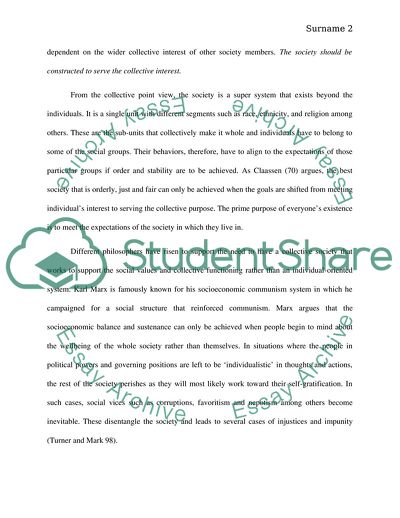Cite this document
(Should Society Be Structured around the Good of the Individual or the Collective Essay Example | Topics and Well Written Essays - 1250 words, n.d.)
Should Society Be Structured around the Good of the Individual or the Collective Essay Example | Topics and Well Written Essays - 1250 words. https://studentshare.org/philosophy/1873944-should-society-be-structured-around-the-good-of-the-individual-or-the-good-of-the-collective-use-hospers-marx-andor-mill-to-defend-your-thesis
Should Society Be Structured around the Good of the Individual or the Collective Essay Example | Topics and Well Written Essays - 1250 words. https://studentshare.org/philosophy/1873944-should-society-be-structured-around-the-good-of-the-individual-or-the-good-of-the-collective-use-hospers-marx-andor-mill-to-defend-your-thesis
(Should Society Be Structured Around the Good of the Individual or the Collective Essay Example | Topics and Well Written Essays - 1250 Words)
Should Society Be Structured Around the Good of the Individual or the Collective Essay Example | Topics and Well Written Essays - 1250 Words. https://studentshare.org/philosophy/1873944-should-society-be-structured-around-the-good-of-the-individual-or-the-good-of-the-collective-use-hospers-marx-andor-mill-to-defend-your-thesis.
Should Society Be Structured Around the Good of the Individual or the Collective Essay Example | Topics and Well Written Essays - 1250 Words. https://studentshare.org/philosophy/1873944-should-society-be-structured-around-the-good-of-the-individual-or-the-good-of-the-collective-use-hospers-marx-andor-mill-to-defend-your-thesis.
“Should Society Be Structured Around the Good of the Individual or the Collective Essay Example | Topics and Well Written Essays - 1250 Words”. https://studentshare.org/philosophy/1873944-should-society-be-structured-around-the-good-of-the-individual-or-the-good-of-the-collective-use-hospers-marx-andor-mill-to-defend-your-thesis.


